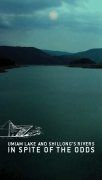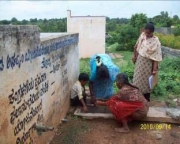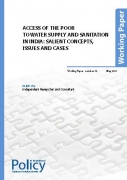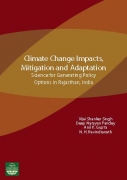/topics/water-management
Water Management
Umiam Lake and Shillong's Rivers: In spite of the odds – An advocacy flyer by Arghyam and Peoples Learning Centre
Posted on 22 Dec, 2010 11:01 PM This advocacy flyer by Arghyam and Peoples Learning Centre (PLC) Shillong highlights some of the main problems, action underway and potential solutions to cleaning up the water bodies of Shillong. It deals with the expanding human habitats and escalating socio-economic activities around the rivers Umkrah and Umshyrpi that flow through Shillong leading to their choking with sewage and pollution. This wastewater eventually enters Lake Umiam, which is a reservoir for hydro-electric power.
This advocacy flyer by Arghyam and Peoples Learning Centre (PLC) Shillong highlights some of the main problems, action underway and potential solutions to cleaning up the water bodies of Shillong. It deals with the expanding human habitats and escalating socio-economic activities around the rivers Umkrah and Umshyrpi that flow through Shillong leading to their choking with sewage and pollution. This wastewater eventually enters Lake Umiam, which is a reservoir for hydro-electric power.
PLC is a non-profit organisation that works towards promoting knowledge on equity and rights, and is a platform for facilitating interdisciplinary dialogues between stakeholders in key developmental issues. Arghyam supports PLC in engaging with decision makes as well as citizens in order to create public opinion about river and lake pollution, and promote catchment friendly practices.
Evaluating and mapping of SCS Curve Numbers for Lokapavani catchment of Karnataka
Posted on 22 Dec, 2010 09:58 PMThis study by Geospatial World attempts to collect and analyse data concerning the catchment characteristics that affect direct runoff such as soil type, land cover and rainfall for the catchment of Lokapavani river in Karnataka using remote sensing and GIS techniques. An attempt has been made to determine the weighted average Curve Number (CN) for different land use, land cover and soil types in Lokapavani catchment in order to estimate the runoff.
Benefits, issues and status of WATSAN systems - A survey of an IDWM project supported by Arghyam
Posted on 22 Dec, 2010 07:56 PM This paper presents the results of a survey of WATSAN systems implemented under an Integrated Domestic Water Management (IDWM) project supported by Arghyam and implemented by MYRADA and MYKAPS in Bangarpet and H D Kote blocks of Kolar district of Karnataka. Arghyam has promoted Roof-top Rain Water Harvesting (RRWH) and eco-sanitation systems in its various project areas through its partner organizations.
This paper presents the results of a survey of WATSAN systems implemented under an Integrated Domestic Water Management (IDWM) project supported by Arghyam and implemented by MYRADA and MYKAPS in Bangarpet and H D Kote blocks of Kolar district of Karnataka. Arghyam has promoted Roof-top Rain Water Harvesting (RRWH) and eco-sanitation systems in its various project areas through its partner organizations.
This project aimed at developing an integrated approach to domestic water management. It focused on construction of RRWH and eco-sanitation toilets in four villages in the project area in Kolar with the aim of creating models of integrated management of domestic water and sanitation in a rural set-up.
Invitation to Nominate 2011 Stockholm Industry Water Award
Posted on 21 Dec, 2010 04:58 PMContent and Image Courtesy: Stockholm Industry Water Award (SIWA)
The Stockholm International Water Institute (SIWI) is a policy institute whose diverse Stockholm-based, internationally-oriented programmes and activities contribute to finding sustainable solutions to the world’s escalating water crisis. SIWI manages projects, synthesises research and publishes findings and recommendations on current and future water, environment, governance and human development issues.
Land acquisition for Renuka dam continues despite uncertainties - Press release from the Renuka Bandh Sangharsh Samiti
Posted on 21 Dec, 2010 12:24 PMForwarded to the portal by: Manshi Asher
Content Courtesy: Himvani
Author: Renuka Bandh Sangharsh Samiti
Despite protest against forced acquisition of land, Himachal Pradesh Power Corporation Limited (HPPCL) and revenue administration today notified Section 9 of the Land Acquisition Act 1894, for approximately 680 big has (about 57 hectares) of land of Panaar Village for the Renuka Dam Project. In a letter to the Chief Justice of Himachal Pradesh High Court sent today, activists appealed for a stay on land acquisition for the project, considering the uncertainty surrounding the project.
Access of the poor to water supply and sanitation in India - Salient concepts, issues and cases by the International Policy Centre for Inclusive Growth
Posted on 20 Dec, 2010 10:04 PM This paper by the International Policy Centre for Inclusive Growth deals with access of the poor to water supply and sanitation in India. It argues that economic, technical, institutional as well as social factors constrain access to safe drinking water and proper sanitation in India for both the urban and rural poor, and that coverage figures do not reflect this restricted access. It finds that, increasingly, communities are being required to manage their own water and sanitation schemes, not just in rural areas but in urban ones as well.
This paper by the International Policy Centre for Inclusive Growth deals with access of the poor to water supply and sanitation in India. It argues that economic, technical, institutional as well as social factors constrain access to safe drinking water and proper sanitation in India for both the urban and rural poor, and that coverage figures do not reflect this restricted access. It finds that, increasingly, communities are being required to manage their own water and sanitation schemes, not just in rural areas but in urban ones as well.
The paper deals with domestic water supply and sanitation and presents a historical overview of the phenomenon in rural and urban India. This is followed by a critique of available figures for coverage which, it is contended, seem exaggerated because they do not account for the several constraints to access. It addresses the specific institutional problems faced in the public sector delivery of these two utilities in India apart from dealing with the parallel yet thus far limited presence of the private sector in these twin arenas.
Climate change impacts, mitigation and adaptation - Science for generating policy options in Rajasthan
Posted on 20 Dec, 2010 09:14 PM This paper by Rajasthan Pollution Control Board on climate change impacts in the context of Rajasthan seeks to address the issue of need of the society for robust knowledge to pursue strategies for mitigation as well as adaptation in order to address the challenges associated with global warming and climate change.
This paper by Rajasthan Pollution Control Board on climate change impacts in the context of Rajasthan seeks to address the issue of need of the society for robust knowledge to pursue strategies for mitigation as well as adaptation in order to address the challenges associated with global warming and climate change.
Accordingly, here a brief review of the available literature and an annotated bibliography of published research on climate change impacts, mitigation and adaptation in order to facilitate the identification of policy options in Rajasthan is provided.
Also included is the literature on how human societies contribute to environmental change and how, in turn, become vulnerable to these changes. It also explores the available knowledge on how likely ecosystem goods and services are impacted to climatic oscillations (environmental sensitivity) and the ability of rural communities to cope (social resilience) with those changes.
Understanding groundwater - A course by ACWADAM
Posted on 20 Dec, 2010 01:01 AMThe Advanced Centre for Water Resources Development and Management (ACWADAM) has created a power-point course to explain the formation of groundwater and its management.
The course consists of 6 modules; it includes the basics of understanding groundwater, study of geology, groundwater level and movement, planning and management of groundwater, storage and flow of groundwater and water quality. The modules have been made into succinct power-point presentations that include charts, diagrams and photographs besides the written word.
Environmental compliance of hydel projects in Himachal Pradesh - Shukla committee report (2009)
Posted on 20 Dec, 2010 12:43 AMThe terms of reference for monitoring included the following:
Mining - An increasing threat to our rivers - Article by Nitya Jacob
Posted on 20 Dec, 2010 12:29 AMContent Courtesy: Solution Exchange and Nitya Jacob
Author: Nitya Jacob
India’s arteries are choking. Her rivers, the lifeline of hundreds of millions, are over-taxed, polluted and encroached. They are being mined, dammed and emptied of water. Save for the four monsoon months, most rivers are streams of drains, depending on how many cities they pass through. This year people gaped in awe at the River Yamuna (I am sure they were over-awed by other rivers elsewhere too) as for the first time since 1978 looked like a river and not a drain.







